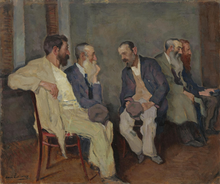 |
| "The Conversation," Arnold Lakhovsky |
You're at a conference or a seminar and it's time to connect with people. Ugh.
You're there to sell yourself, of course, but the route to that is counter intuitive. To succeed, you have to focus on the other person.
If you let the other person sell himself to you he will leave thinking you're the smartest person in the room.
Here are some suggestions on building rapport from Robin Dreeke, author of It’s Not All About Me. Dreeke is the lead instructor at the FBI’s Counterintelligence Training Center in all behavioral and interpersonal skills training.
Hmmm. Shane Parrish breaks it down:
1. Establish time constraints. "The first step in the process of developing great rapport and having great conversations is letting the other person know that there is an end in sight, and it is really close."
2. Smile. Duh. "Adding a slight head tilt shows the other person that you have comfort with them and trust them. Another nonverbal to try and maintain is a slightly lower chin angle." (A high chin makes them feel you're looking down on them.)
3. Don't stand toe to toe. "A slight body angle or blade away from the individual you are engaging will present a much more accommodating nonverbal."
4. Shake hands correctly. "An accommodating handshake is one that matches the strength of the other, and also takes more of a palm up angle."
5. Speak slowly. "Whenever I have a conversation that I believe is important for me to be credible in my content, I purposely slow down the delivery and take pauses for people to absorb the content of what I have just said."
6. Suspend your ego. "Suspending your ego is nothing more complex than putting other individuals’ wants, needs, and perceptions of reality ahead of your own. Most times, when two individuals engage in a conversation, each patiently waits for the other person to be done with whatever story he or she is telling. Then, the other person tells his or her own story, usually on a related topic and often times in an attempt to have a better and more interesting story. Individuals practicing good ego suspension would continue to encourage the other individual to talk about his or her story, neglecting their own need to share what they think is a great story."
7. Listen. "This validation coupled with ego suspension means that you have no story to offer, that you are there simply to hear theirs."
More suggestions at Farnam Street.
No comments:
Post a Comment